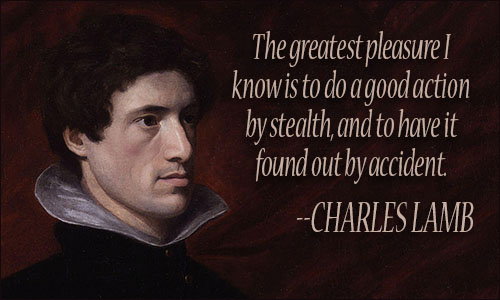CHARLES LAMB QUOTES
English essayist and critic (1775-1834)

Notice: Undefined variable: id in /hermes/walnacweb03/walnacweb03ak/b2149/pow.notablequote/htdocs/l/includes/quoter.php on line 25
The greatest pleasure I know is to do a good action by stealth, and to have it found out by accident.
CHARLES LAMB
Notice: Undefined variable: id in /hermes/walnacweb03/walnacweb03ak/b2149/pow.notablequote/htdocs/l/includes/quoter.php on line 35
"Table-Talk and Fragments of Criticism", The Life and Works of Charles Lamb
Notice: Undefined variable: id in /hermes/walnacweb03/walnacweb03ak/b2149/pow.notablequote/htdocs/l/includes/quoter.php on line 61
Men marry for fortune, and sometimes to please their fancy; but, much oftener than is suspected, they consider what the world will say of it--how such a woman in their friends' eyes will look at the head of a table. Hence we see so many insipid beauties made wives of, that could not have struck the particular fancy of any man that had any fancy at all.
CHARLES LAMB
"Table-Talk and Fragments of Criticism", The Life and Works of Charles Lamb
Every commonplace or trite observation is not a truism.
CHARLES LAMB
Mrs. Leicester's School and Other Writings in Prose and Verse
Think what you would have been now, if instead of being fed with tales and old wives' fables in childhood, you had been crammed with geography and natural history!
CHARLES LAMB
letter to Samuel Taylor Coleridge, Oct. 23, 1802
A book reads the better which is our own, and has been so long known to us, that we know the topography of its blots, and dog's ears, and can trace the dirt in it to having read it at tea with buttered muffins.
CHARLES LAMB
letter to Samuel Taylor Coleridge, Oct. 11, 1802
Anything awful makes me laugh.
CHARLES LAMB
letter to Robert Southey, Aug. 9, 1815
Tis the privilege of friendship to talk nonsense, and to have her nonsense respected.
CHARLES LAMB
letter to Samuel Taylor Coleridge, Feb. 13, 1797
Reader, if you are gifted with nerves like mine, aspire to any character but that of a wit.
CHARLES LAMB
"Confessions of a Drunkard", The Last Essays of Elia
Rags, which are the reproach of poverty, are the beggar's robes, and graceful insignia of his profession, his tenure, his full dress, the suit of which he is expected to show himself in public.
CHARLES LAMB
Essays of Elia
Cultivate simplicity ... or rather should I say banish elaborateness, for simplicity springs spontaneous from the heart, and carries into daylight with it its own modest buds, and genuine, sweet, and clear flowers of expression.
CHARLES LAMB
letter to Samuel Taylor Coleridge, Nov. 8, 1796
Not many sounds in life, and I include all urban and rural sounds, exceed in interest a knock at the door.
CHARLES LAMB
"Valentine's Day", Essays of Elia
Can we ring the bells backward? Can we unlearn the arts that pretend to civilize, and then burn the world? There is a march of science; but who shall beat the drums for its retreat?
CHARLES LAMB
letter to George Dyer, Dec. 20, 1830
Who first invented work and bound the free
And holiday-rejoicing spirit down
To the unremitting importunity
Of business, in the green fields, and the town;
To plough, loom, anvil, spade--and oh! most sad!
To this dry drudgery of the desk's dead wood?
Who but the Being unblest, alien from good,
SABBATHLESS SATAN!
CHARLES LAMB
"Sonnet", The Examiner, Jun. 20, 1819
I love to lose myself in other men's minds.
CHARLES LAMB
"Detached Thoughts on Books and Reading", Last Essays of Elia
He is no lawyer who cannot take two sides.
CHARLES LAMB
letter to Mr. Rogers, Dec. 1833
The vices of some men are magnificent.
CHARLES LAMB
"Table-Talk and Fragments of Criticism", The Life and Works of Charles Lamb
The man must have a rare recipe for melancholy, who can be dull in Fleet Street.
CHARLES LAMB
letter to Thomas Manning, Feb. 15, 1802
A laxity pervades the popular use of words.
CHARLES LAMB
"Table-Talk and Fragments of Criticism", The Life and Works of Charles Lamb
Time partially reconciles us to anything. I gradually became content--doggedly contented, as wild animals in cages.
CHARLES LAMB
"The Superannuated Man", Elia and The last essays of Elia
A man can never have too much Time to himself, nor too little to do. Had I a little son, I would christen him Nothing-To-Do; he should do nothing. Man, I verily believe, is out of his element as long as he is operative. I am altogether for the life contemplative.
CHARLES LAMB
"The Superannuated Man", Last Essays of Elia